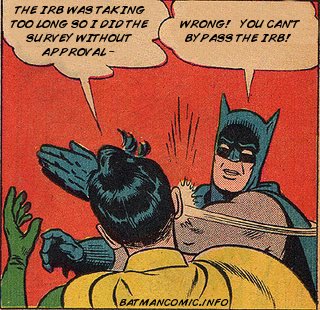|
|
| Image from Southern Fried Science |
There was a lot of confusion at first when filling out IRB because we were so low risk, and then had to deal with so many restrictions. Our IRB rep explained that historically, any research involving human subjects needed to come through them, and this was a ton of work for them to handle even if research studies proposed didn't really need to be under their jurisdiction. More recently, "Research" with a capital R has been defined by the federal government as being generalizable (some of this info might be here, though our rep said there isn't one definitive page or site explaining this yet for the general public). This is wholly different from research that is not meant to be generalizable, for example: program evaluations, quality improvement, case studies, etc.
It was funny because after providing the explanation, our rep wanted to backtrack and say that she wasn't implying we aren't doing "research," we just aren't doing "Research." We in fact are doing program evaluation research because we are measuring a specific program at the UA in order to improve the program and will be showing what was successful/problematic for us. We would not be saying our results clearly apply to all IL programs or credit courses across the country. However, if we did want to try to prove that somehow, we would need to stay under their jurisdiction (we have been approved as Exempt level 2 I believe). If we were to stay under IRB, we have to keep them updated on any changes to methods and the form of consent for students, as well as if we were to make any changes in obtaining data. We would also have a ton of restrictions in what we can and cannot access with student info.
Filling out what is the "309 form" here at the UA to essentially rescind our IRB application (I am thrilled to do this, but it's probably not a good idea for me to think about how much time I spent on this for my own sanity) will then move us to program evaluation and we can essentially do whatever we want so long as it's generally ethical and follows FERPA regulations.
With IRB, we would have had to only do an opt-in to our study for students, anonymize data to potentially miss out on seeing trends, and be cautious about asking certain questions in our survey. As program evaluation, we can really gather data any way we want.
My co-researcher made a good point that the basis for Research vs research is in the eye of the beholder (the reader). We won't be saying our research is generalizable, but obviously if someone is reading the article (if we are able to get published, of course), that means they are considering how they might apply our findings to their own program or credit course. It can be very nuanced.
So anyhow, I just wanted to share this. It sounds like it's getting a big push not just on our campus but all over. This conflicts with LIS anxiety over publishing Research, but program evaluation is not any less important. The only distinction is that it does not go through IRB.
